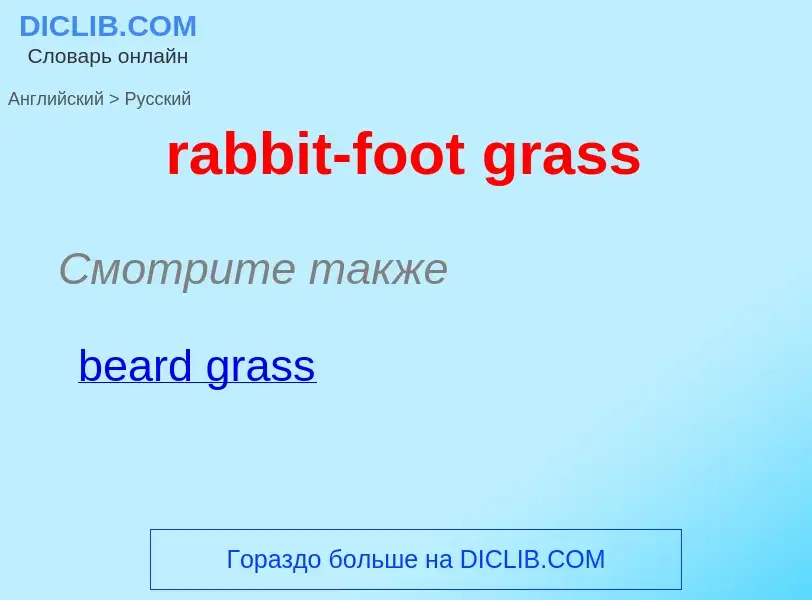Traducción y análisis de palabras por inteligencia artificial ChatGPT
En esta página puede obtener un análisis detallado de una palabra o frase, producido utilizando la mejor tecnología de inteligencia artificial hasta la fecha:
- cómo se usa la palabra
- frecuencia de uso
- se utiliza con más frecuencia en el habla oral o escrita
- opciones de traducción
- ejemplos de uso (varias frases con traducción)
- etimología
rabbit-foot grass - traducción al Inglés
Смотрите также
общая лексика
Братец Кролик (сказочный персонаж)
Definición
Wikipedia

In some cultures, a rabbit's foot is carried as an amulet believed to bring good luck. This belief is held by individuals in a great number of places around the world, including Europe, China, Africa, and North and South America. In variations of this superstition, the rabbit it came from must possess certain attributes, such as having been killed in a particular place, using a particular method, or by a person possessing particular attributes (e.g., by a cross-eyed man).
It has been suggested by Benjamin Radford that the rabbit's foot could be connected to a European good luck charm called the Hand of Glory, a hand cut from a hanged man and then pickled.
Humorist R. E. Shay is credited with the witticism, "Depend on the rabbit's foot if you will, but remember it didn't work for the rabbit."



![Br'er Rabbit in [[Walt Disney]]'s ''[[Song of the South]]'' (1946). Disney's version of the character is more stylized and cartoony than the illustrations of Br'er Rabbit in Harris' books.<ref name=Brasch2000/> Br'er Rabbit in [[Walt Disney]]'s ''[[Song of the South]]'' (1946). Disney's version of the character is more stylized and cartoony than the illustrations of Br'er Rabbit in Harris' books.<ref name=Brasch2000/>](https://commons.wikimedia.org/wiki/Special:FilePath/Brer Rabbit Disney screenshot.png?width=200)
![A.B. Frost]] illustration of Brer Rabbit and the Tar Baby from the 1895 version of ''Uncle Remus: His Songs and Sayings'' A.B. Frost]] illustration of Brer Rabbit and the Tar Baby from the 1895 version of ''Uncle Remus: His Songs and Sayings''](https://commons.wikimedia.org/wiki/Special:FilePath/Brer Rabbit and the Tar Baby.jpg?width=200)

![[[Eatonton, Georgia]]'s statue of Br'er Rabbit [[Eatonton, Georgia]]'s statue of Br'er Rabbit](https://commons.wikimedia.org/wiki/Special:FilePath/Eatonton ga-brer rabbit-2.jpg?width=200)
![The [[African savanna hare]] (''Lepus microtis'') found in many regions on the African continent: the original Br'er Rabbit. The [[African savanna hare]] (''Lepus microtis'') found in many regions on the African continent: the original Br'er Rabbit.](https://commons.wikimedia.org/wiki/Special:FilePath/Smit.Lepus crawshayi.jpg?width=200)
